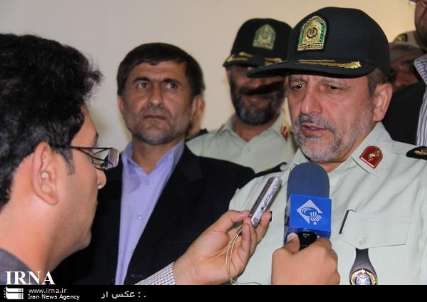ID :
298153
Sat, 09/07/2013 - 08:15
Auther :
Shortlink :
https://oananews.org//node/298153
The shortlink copeid
IRIP Chief: Chemical Bombardments Of Halabja, Sardasht Must Be Highlighted

Mahabad, W.Azarbaijan Prov, Sept 7, IRNA – Chemical bombardment of Halabja in Iraq and Sardahst in Iran should be highlighted today and those responsible for them should be punished, said the IRI Police Chief Brigadier General Esma’eil Ahamadi-Moqaddam here Thursday.
Speaking to the reporters in Mahabad, General Ahmadi-Moqaddam said that in those horrendous war crimes 5,000 innocent people, mostly women and children lost their lives.
He added, “It is our duty today to highlight the various aspects of those crimes and to clarify who provided those weapons for Saddam Hussein, and to fight for the ignored rights of those innocent victims.
He talked about the most bitter memory of his first visit of Halabja and the saddest moments of his life, saying, “In that genocide attacks thousands of defenseless people of that city lost their lives.”
Brigadier General Ahmadi-Moqaddam praised the bravery of the combatants of Islam in safeguarding the security of the country’s western borders, adding, such bravery in the way of ensuring the security of this country must be narrated for the future generations.
He reiterated, “Our people sacrificed their lives and their wealth and paid a high price for preserving Iran’s security and territorial integrity.”
The Halabja chemical attack, also known as Halabja massacre or Bloody Friday, was a genocidal massacre against the Kurdish people that took place on March 16, 1988, during the closing days of the Iran–Iraq War.
It occurred in the Kurdish town of Halabja in Southern Kurdistan. The attack was part of the Al-Anfal campaign in northern Iraq, as well as part of the Iraqi attempt to repel the Iranian Operation Zafar 7. It took place 48 hours after the fall of the town to the Iranian forces and Kurdish guerrillas.
The attack killed between 3,200 and 5,000 people and injured between 7,000 to 10,000 more, most of them civilians. Thousands more died of complications, diseases, and birth defects in the years after the attack. The incident, which has been officially defined as an act of genocide against the Kurdish people in Iraq, was and still remains the largest chemical weapons attack directed against a civilian-populated area in history.
The Halabja attack has been recognized as a separate event from the Anfal Genocide that was also conducted against the Kurdish people by the Iraqi regime under Saddam Hussein.
The Iraqi High Criminal Court recognized the Halabja massacre as an act of genocide on March 1, 2010, a decision welcomed by the Kurdistan Regional Government.
The attack was also condemned as a crime against humanity by the Parliament of Canada./end





